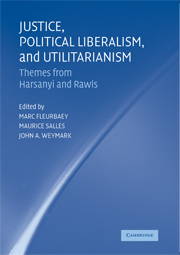Book contents
- Frontmatter
- Contents
- Preface
- List of Contributors
- 1 An Introduction to Justice, Political Liberalism, and Utilitarianism
- PART ONE THEMES FROM RAWLS
- 2 John Rawls's Theory of Justice: Some Critical Comments
- 3 Rawls, Responsibility, and Distributive Justice
- 4 Improving Our Ethical Beliefs
- PART TWO HARSANYI'S IMPARTIAL OBSERVER AND SOCIAL AGGREGATION THEOREMS
- PART THREE GOODNESS AND WELL-BEING
- PART FOUR SHARING THE GAINS FROM SOCIAL COOPERATION
- PART FIVE RIGHTS AND LIBERTIES
- Index
3 - Rawls, Responsibility, and Distributive Justice
Published online by Cambridge University Press: 09 February 2010
- Frontmatter
- Contents
- Preface
- List of Contributors
- 1 An Introduction to Justice, Political Liberalism, and Utilitarianism
- PART ONE THEMES FROM RAWLS
- 2 John Rawls's Theory of Justice: Some Critical Comments
- 3 Rawls, Responsibility, and Distributive Justice
- 4 Improving Our Ethical Beliefs
- PART TWO HARSANYI'S IMPARTIAL OBSERVER AND SOCIAL AGGREGATION THEOREMS
- PART THREE GOODNESS AND WELL-BEING
- PART FOUR SHARING THE GAINS FROM SOCIAL COOPERATION
- PART FIVE RIGHTS AND LIBERTIES
- Index
Summary
The theory of justice pioneered by John Rawls explores a simple idea – that the concern of distributive justice is to compensate individuals for misfortune. Some people are blessed with good luck; some are cursed with bad luck, and it is the responsibility of society – all of us regarded collectively – to alter the distribution of goods and evils that arises from the jumble of lotteries that constitutes human life as we know it. Some are lucky to be born wealthy, or into a favorable socializing environment, or with a tendency to be charming, intelligent, persevering, and the like. These people are likely to be successful in the economic marketplace and to achieve success in other important ways over the course of their lives. However, some people are, as we say, born to lose. Distributive justice stipulates that the lucky should transfer some or all of their gains due to luck to the unlucky.
In A Theory of Justice, Rawls suggests how to draw a line between the misfortune that is society's responsibility and the misfortune that is not by distinguishing between deep and shallow inequalities. The former are associated with inequalities in the “basic structure” of society in this passage:
For us the primary subject of justice is the basic structure of society, or more exactly, the way in which the major social institutions distribute fundamental rights and duties and determine the division of advantages from social cooperation. […]
- Type
- Chapter
- Information
- Justice, Political Liberalism, and UtilitarianismThemes from Harsanyi and Rawls, pp. 80 - 107Publisher: Cambridge University PressPrint publication year: 2008
- 21
- Cited by



